Life Insurance Term Meaning
English Vocabulary Lesson
In this lesson, we will explain in simple
words what is the meaning of term life insurance.
We will discuss key insurance concepts, review a story dialogue that
uses life insurance terms in context, and take a vocabulary quiz to
test your understanding.
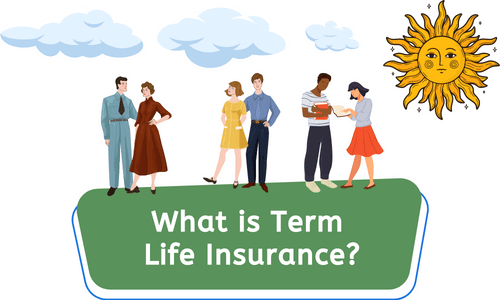
Lesson Table of Contents
1. Basic Insurance Vocabulary and Term Life Insurance5. Answers
Basic Insurance Vocabulary and Term Life Insurance
Insurance is an agreement between you and a company. You pay a certain amount of money regularly (for example every month), and the company (called an insurance company) agrees to pay a larger amount of money if something specific happens (for example, an injury, illness, accident, or death).
If that thing does not happen, then the insurance
company keeps the money. If that thing does happen, then
the insurance company pays a large amount of money to you or the
people you selected in advance.
A premium is the monthly cost of
your insurance. The regular payments you make are called premiums.

Life insurance is a type of insurance that
provides a payment to the people you have named as beneficiaries
if you pass away (die). This can be used to help pay final expenses,
such as funeral costs, or provide an income for your family.
Beneficiaries are the people you select to receive the money from your life insurance plan if you pass away.
Beneficiaries are the people you select to receive the money from your life insurance plan if you pass away.


For example, Bob signs a life insurance agreement
(called a life insurance policy). Bob pays a small amount of
money each month (a premium). If Bob passes away, then Bob's family
(who he selected as the beneficiaries) receive a large amount of
money from the insurance company. This money is called a death
benefit (or face value).
Let's say Bob's family receives $500,000. In that case, the death benefit / face value is $500,000.
Let's say Bob's family receives $500,000. In that case, the death benefit / face value is $500,000.
(A policy is a signed document
containing the agreement between you and the insurance company.)
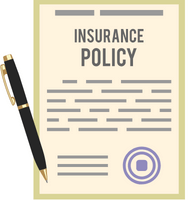
Term life insurance is a type of
life insurance that covers you for a specific length of time,
usually between 10 and 30 years. If you pass away during the term
(time period) of your life insurance, the insurance company will pay
a sum of money to the beneficiaries you have named. If you do not
pass away during the term of your life insurance, then no payment is
made.

Life Insurance TERM versus WHOLE
Whole life insurance is much more expensive than term
life insurance.Whole life insurance is a type of insurance that is not limited to a specific term and lasts your entire life (as long as you keep paying your premiums). In addition, in a whole life insurance plan, some of the money you pay is invested by the insurance company.
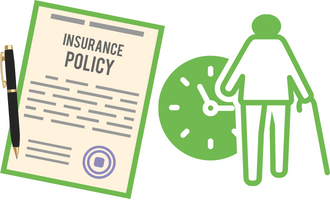


Cash value is the money that is invested and grows over time in a whole life insurance plan.
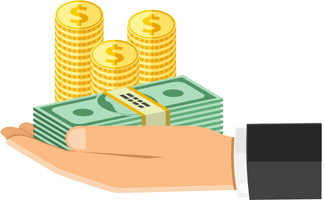
So in a whole life insurance plan, every payment covers the following:
- keeping the insurance active so that beneficiaries can receive the death benefit in case the insured person passes away (the face value)
- investing some of the money for the purpose of making a profit (cash value)
- fees and different costs
of running the insurance plan (insurance company costs,
insurance agent costs, etc.)
(An insurance agent is a person who sells insurance).

Example:
Bob purchases a whole life insurance policy. Every month he pays a premium of $100.
The face value of the insurance
policy he purchased is $100,000. This means that if he passes away,
his beneficiaries will receive $100,000 (the death
benefit).
So the monthly payment of $100 goes to cover the future death benefit, the costs of the insurance company and insurance agent, and a small part is invested to generate future profit.
As a result, Bob manages to save $5000.
The way for Bob to get the money he saved is to cancel his life insurance. Then he can receive the $5000. But, he will no longer be insured, and no death benefit will be paid to his family if he passes away.
Bob could also withdraw some or all of his cash value. But that would reduce his death benefit or even eliminate it completely. (To withdraw means to take the money out.)
So the monthly payment of $100 goes to cover the future death benefit, the costs of the insurance company and insurance agent, and a small part is invested to generate future profit.
As a result, Bob manages to save $5000.
The way for Bob to get the money he saved is to cancel his life insurance. Then he can receive the $5000. But, he will no longer be insured, and no death benefit will be paid to his family if he passes away.
Bob could also withdraw some or all of his cash value. But that would reduce his death benefit or even eliminate it completely. (To withdraw means to take the money out.)


Story Dialogue to Demonstrate Using Life Insurance Terms in Context

Bob: I need to get some life
insurance. Do you know what type is best for me?
Agent: Well, it depends on how long you want to be covered.
Bob: I'm in my 30s and I want to make sure my family is taken care of if something happens to me.
Agent: Then a term life insurance plan might be best for you. It's less expensive than whole life insurance, but it only lasts for a specific length of time, usually between 10 and 30 years.
Bob: What about whole life insurance?
Agent: Whole life insurance lasts your entire life. It's much more expensive than term life insurance, but it also has a cash value that grows over time. So if you ever need to borrow money, you can borrow against the cash value.
Bob: Why do I need to borrow my own saved money and pay interest on it?
Agent: You don't have to borrow against it, but it's an option if you want access to the money you saved.
Bob: Hmm, I see. Why is whole life insurance much more expensive than term life insurance?
Agent: Well, whole life insurance has more fees and costs associated with it. Plus, insurance agents are paid more on whole life policies than on term policies.
Bob: Why is that?
Agent: Whole life insurance is permanent coverage, which means that the insurance company will most likely have to pay out on the policy at some point. In contrast, with term life insurance, there is only a small chance that the company will ever have to pay out, so premiums are lower.
Bob: I suppose they need to make a living too... Makes sense. So what's you best advice?
Agent: If you can afford it, I suggest getting a term life policy now and investing the difference. That way you'll have coverage if something happens to you, and your money will be growing while staying under your control. And who knows, maybe you'll accumulate enough assets that you eventually won't need life insurance at all!
Bob: Thanks for being so truthful! That sounds like a solid plan. Let's get started!
Agent: Glad to help! Let's begin by filling out some paperwork...
This is an example of how life insurance terms can be used in context.
Agent: Well, it depends on how long you want to be covered.
Bob: I'm in my 30s and I want to make sure my family is taken care of if something happens to me.
Agent: Then a term life insurance plan might be best for you. It's less expensive than whole life insurance, but it only lasts for a specific length of time, usually between 10 and 30 years.
Bob: What about whole life insurance?
Agent: Whole life insurance lasts your entire life. It's much more expensive than term life insurance, but it also has a cash value that grows over time. So if you ever need to borrow money, you can borrow against the cash value.
Bob: Why do I need to borrow my own saved money and pay interest on it?
Agent: You don't have to borrow against it, but it's an option if you want access to the money you saved.
Bob: Hmm, I see. Why is whole life insurance much more expensive than term life insurance?
Agent: Well, whole life insurance has more fees and costs associated with it. Plus, insurance agents are paid more on whole life policies than on term policies.
Bob: Why is that?
Agent: Whole life insurance is permanent coverage, which means that the insurance company will most likely have to pay out on the policy at some point. In contrast, with term life insurance, there is only a small chance that the company will ever have to pay out, so premiums are lower.
Bob: I suppose they need to make a living too... Makes sense. So what's you best advice?
Agent: If you can afford it, I suggest getting a term life policy now and investing the difference. That way you'll have coverage if something happens to you, and your money will be growing while staying under your control. And who knows, maybe you'll accumulate enough assets that you eventually won't need life insurance at all!
Bob: Thanks for being so truthful! That sounds like a solid plan. Let's get started!
Agent: Glad to help! Let's begin by filling out some paperwork...
This is an example of how life insurance terms can be used in context.
Disclaimer: This
English vocabulary lesson is for informational and educational
purposes only. It is not intended to be a substitute for
professional advice.
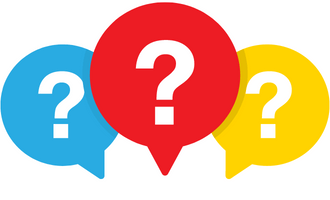
1) What is the meaning of "cash value"?
A. An account within a life insurance policy that grows over time.
B. The amount of money paid out by an insurance company if the insured passes away.
C. A regular payment to the insurance company.
2) What is the meaning of "death benefit"?
A. An account within a life insurance policy that grows over time.
B. The amount of money paid out by an insurance company if the insured passes away.
C. A regular payment to the insurance company.
3) What is the meaning of "premium"?
A. An account within a life insurance policy that grows over time.
B. The amount of money paid out by an insurance company if the insured passes away.
C. A regular payment to the insurance company.
4) Which type of life insurance is usually much less expensive?
A. Whole life insurance
B. Term life insurance
C. They cost roughly the same
5) What is the meaning of "term life insurance"?
A. Life insurance that lasts your entire life.
B. Insurance coverage for a specific period of time.
C. An account within a life insurance policy that grows over time.
6) What is the meaning of "whole life insurance"?
A. Life insurance that lasts your entire life.
B. Insurance coverage for a specific period of time.
C. An account within a life insurance policy that grows over time.

A. An account within a life insurance policy that grows over time.
B. The amount of money paid out by an insurance company if the insured passes away.
C. A regular payment to the insurance company.
2) What is the meaning of "death benefit"?
A. An account within a life insurance policy that grows over time.
B. The amount of money paid out by an insurance company if the insured passes away.
C. A regular payment to the insurance company.
3) What is the meaning of "premium"?
A. An account within a life insurance policy that grows over time.
B. The amount of money paid out by an insurance company if the insured passes away.
C. A regular payment to the insurance company.
4) Which type of life insurance is usually much less expensive?
A. Whole life insurance
B. Term life insurance
C. They cost roughly the same
5) What is the meaning of "term life insurance"?
A. Life insurance that lasts your entire life.
B. Insurance coverage for a specific period of time.
C. An account within a life insurance policy that grows over time.
6) What is the meaning of "whole life insurance"?
A. Life insurance that lasts your entire life.
B. Insurance coverage for a specific period of time.
C. An account within a life insurance policy that grows over time.
Answers

1. A | 2. B | 3. C | 4. B | 5. B | 6. A
Get Updates, Special Offers, and English Resources
Download your FREE GIFT (the first two chapters of
English Short Stories Book and Workbook)
as soon as you join!

By submitting your email, you consent to receiving updates and newsletters from us and to the sharing of your personal data with third parties for the purposes of sending you communications. We will not spam you. You can unsubscribe at any time. For more information, please see our privacy policy.





